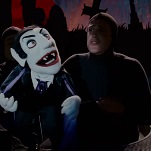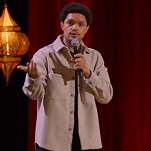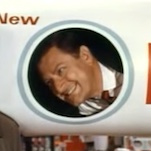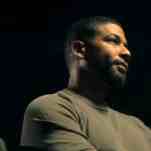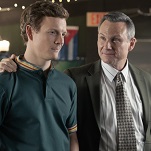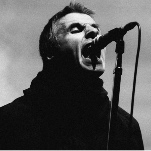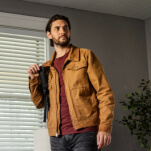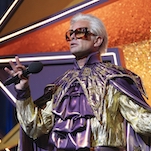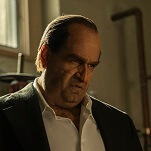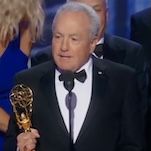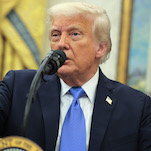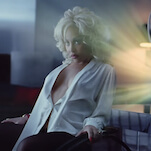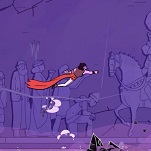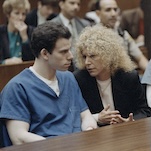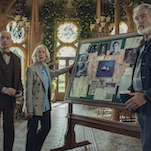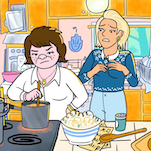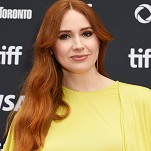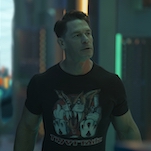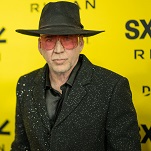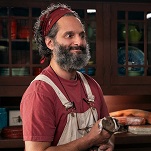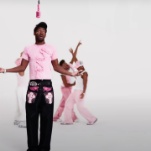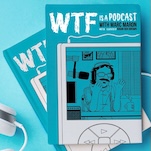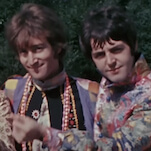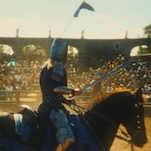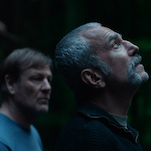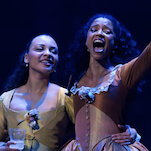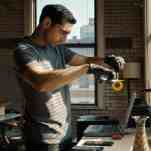Jeff Bridges as Dan Chase in episode one of The Old Man Photo: Prashant Gupta/FX
In 1997, Bob Dylan, in his mid-50s and without an album of original music since 1990’s critically panned and objectively subpar Under The Red Sky, suffered a bout of near-fatal histoplasmosis pericarditis that forced the cancelation of a European tour and whole lot of severe chest pains. Shortly after recovering, he released Time Out Of Mind. Ambling, rasping, muddily grooving, the late-period masterpiece won three Grammys, including Album Of The Year, and reasserted the old crag into the collective consciousness. Though he would publicly dismiss correlations between the album’s themes and his sickness, it’s impossible not to hear “Standing In The Doorway,” or any of the contemplative, autumnal vibes, without being struck by wizened resignation and late-night wrestling with mortality. Regardless, the work out-voices the man. And for the staunchest of Dylanologists it is his death album and his comeback album in one.
Though the wisdom-garnering is right there in the name, The Old Man, which had its season-one finale July 21, is not Time Out Of Mind. Really, it’s not even Dylan’s 1993 effort World Gone Wrong, rife as it is with the trappings of spy procedurals and narrative bloat settling around the middle like a dad’s beer belly. But in it, Jeff Bridges, with immaculate silver waves, luminous gray whiskers, all linen and weekend business-casual shouldery swagger, and that marbly gruff baritone, announces a comeback. In the way that Dylan used the trademarked Daniel Lanois production to reassert himself, Bridges uses the pedestal of prestige TV to again reclaim his presence after a well-publicized battle with lymphoma and then COVID that left him “pretty close to dying” last year.
In a way, it fits a career-long pattern of sporadic reemergence. After a breakout in The Last Picture Show, Bridges seemed to fall into an easy rhythm of casual semi-stardom, with breezy Western nonchalance and a likability that gave the impression of little care, less to prove. Then came the ’90s. The Fisher King was a commercial but zany meditation on reckoning and redemption. For a story framed by a mass shooting, directed by Terry Gilliam and featuring Robin Williams at his most holy-grail-seeking absurd, there is a disarming level of tenderness. It’s hard to imagine another actor folding such macho swagger and frustrated pathos into Bridges’ humbled and bereft shock jock. Two years later came Fearless, an improbable Hollywood reflection on grief and mortality, that was in turns confounding, puzzling, and oddly real. The pair showed the actor reaching dad-ish middle age in a strange second gear, settling in while also sort of clearing his considerable throat as one of the most singular actors of his generation.
He pulled a similar one-two in 2009-2010, with Crazy Heart and True Grit. In both, Bridges seemed to be paying homage to the many Westerns of his early career, only viewed bemusedly from a grandpa’s easy chair. He suddenly somehow seemed more gruff, deeper, and, yes, grittier, with a timelessness like faded Levi’s and Kris Kristofferson. Both felt Oscar-baity in a quieter, thoughtful, somehow non-annoying way, while a reunion with the Coen Brothers, who gave him his most iconic role, seemed a gesture of Greatest Hits. While it could be easy to take him for granted, he could still be huge, all at once, in his own way, even while playing a bit to the back rows.
And now, The Old Man shows another level of maturity, another shelf in the case. Consider the trick Bridges pulls from the closing moments of the fourth episode through the opening of the fifth: He goes from pleasant head-cocked dinner table charm to looming rage to acquiescence to raspy nodding acceptance, all within moments. And it all feels believable, like a bit of disappointed dad manipulation, where you can’t tell exactly who is being convinced of what and to what end. He is a domestic antihero, at once capable of a warmth that is welcoming and a gravity that is intimidating: loving enough to shed a tear, almost, for having to board his dogs, hard enough to bark a shut-up command before stalking away with nary a look back.
As a father, Bridges’ Dan Chase is the type to casually toss a “what happens to me, happens to me, that’s not important.” Or philosophize on “the series of events it took to create this moment.” He might scold for missing the agreed-upon pickup spot, while furiously commanding a speeding getaway boat. He can be dismissive (“you read it wrong”) or metaphysical (“sometimes there are things you don’t get to know before the curtain comes down”) or unforgivingly passive-aggressive (“I’m sorry this is the hand you were dealt”). He can convince, with only trace condescension, a civilian of being a “highly trained operative.” Likewise, he can dadsplain tradecraft, that of yielding “two weapons in concert, in your left hand is your empathy, in your other hand … your ruthlessness.” He’s discoursing on his usual CIA shit, yes, but he could just as easily be discussing methods of potty training or coaching Little League.
Chase has callbacks to a lot of heavy-hitting big-screen fathers, traces of the wounded devotion of Donald Sutherland in Ordinary People, the no-bullshit guidance of Laurence Fishburne in Boyz n’ the Hood, even the mischievous outside-the-law incorrigibility of Royal Tennenbaum. He could also, somehow, probably, kick Liam Neeson’s ass. Or at least keep him quite busy. Not like what you see in your dad, maybe, but what we all hope for in the narrative of a loving, protective father. And what your dad might see in himself after three Heinekens.
“I learn by doing” and “the weak are mostly dead” are throwaways, and if you can picture another actor delivering such lines, it’s not as easy to see someone else physically embody such a presence. Like the way he sits on a bed after a day of traveling, fortifying against rising fatigue as much as the chasing years, nearly reminding himself to hold steady against gravity, defying age with focus and good posture. When considering a reply, he often has a way of holding his mouth open for a beat, as if the lips themselves are considering all the potential arrows, all the weight of experience with which to load his bow. He seems “sick with experience,” as Robin Williams’ character in Fisher King might put it.
After the show’s beautifully taut, whiplike opening episodes, everything downshifted toward the finish, maybe necessarily, maybe for the best, as the feel took the shape of a shaggy-dog spy story kept mostly afloat simply by Bridges’ being. But losing steam, it seemed to feel the need to explain and over-explain itself, everything getting bogged in a sort of sentimentality. Like, well, yes, an old man. “Everything’s in free fall all the time, we’re not wired to cope with that,” the actor recites, harkening back to the crash in Fearless.
And now here he is, again, this time on our small screens, a different beard and new battle scars, the same rough-hewn grace. With the current shit state of everything around us, it feels good to be riding next to this sort of graying Yoda, who reminds us that behind every beautiful thing there’s been some kind of pain.
Dylan followed Time Out Of Mind with Love And Theft just four years later, and under a microscope, you could say he followed his greatest late-period song, “Not Dark Yet,” with one, somehow, even better: “Mississippi.” Now, with Bridges back in the spotlight and the show picked up for a second season, we’re hoping he can pull off the same feat.

